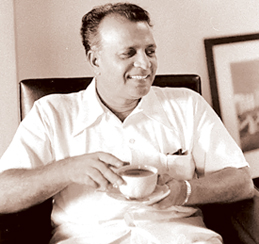Tribute
'Comrade NM, We Did It!'
June 6 marked the 110th birth anniversary of Dr. N.M. Perera, who was
born in the year of the Russian Revolution of 1905 - a revolution that
led to constitutional reform including the establishment of the State
Duma - Russia's first elected parliament, a multi-party system, and the
Russian Constitution of 1906.
 |
|
Dr. N.M. Perera (Life) |
NM passed away in 1979, a year after J.R. Jayewardene's notorious
Constitution of 1978, which strengthened the presidential system of
government, introduced to Sri Lanka by way of the Second Amendment to
the 1972 Constitution, but not before writing a series of articles to
the Socialist Nation, warning the country of the perils of the new
Constitution.
The articles were collected and published in June 1979 on the
occasion of his birthday under the title 'Critical Analysis of The New
Constitution of the Sri Lanka Government.'
NM passed away in August 1979. The booklet soon became the Bible for
those who wish a return to a parliamentary form of government.
NM was unhesitatingly for a parliamentary form of government, not
surprising, given that he was one of Sri Lanka's best-known
parliamentarians. He was awarded a D.Sc. degree by the University of
London for his comparative study of the parliamentary procedures of the
United Kingdom, United States, France and Germany.
Government
He pointed out that the parliamentary form of government had worked
for 30 years in Sri Lanka with a degree of success that had surprised
many western observers. Writing a few weeks before the Second Amendment
was to come into effect, he said: "We look in vain in the speeches of
the Prime Minister for a clear and concise enumeration of the defects of
the present Constitution, which make the wholesale rejection of the
present structure desirable.
"His lame contention that the present system of government makes for
instability and lack of continuity scarcely bear examination."
Since 1978, the Sri Lankan Left unwaveringly raised the need to
totally abolish the executive presidency and return to a parliamentary
form. The issue was raised at every N.M. Perera commemoration event,
every May Day meeting, every Republic Day event on 22 May and every
other possible occasion. The Left's post-1978 literature is replete with
references to the issue.
However, when Mahinda Rajapaksa brought the Eighteenth Amendment,
which further strengthened the executive presidency, the Left MPs
unashamedly voted for it, having first criticised it. NM's party, the
Lanka Sama Samaja Party(LSSP) decided, not once but twice, that its two
Members of Parliament should not participate in the vote. That decision
was disregarded. Tissa Vitarana recently told a Sinhala weekly that
Rajapaksa had warned that Ministers who do not vote for the Amendment
would have to leave the Cabinet. The Communist Party has since admitted
that voting for the Amendment was a mistake. The struggle for the
abolition of the executive presidency entered a decisive phase with the
formation of the National Movement for Social Justice (NMSJ) led by Ven.
Maduluwawe Sobitha Thera.
Momentum
As the momentum built up for showdown with Rajapaksa, Left leaders
looked for excuses not to support a common candidate. They argued that
no president would be willing to give up powers. Vitarana was fond of
citing NM: "The presidential system offers unlimited scope for wielding
absolute powers, albeit for a limited period.
But the taste of unlimited power grows with the feeding and the lust
cannot be easily satiated." Surely, NM did not mean that Sri Lanka would
never be able to get rid of the executive presidency!
Even before Rajapaksa called for an early election, Vitarana proposed
in the Central Committee that the LSSP should support him. He argued
that Ranil Wickremesinghe would be the common candidate and that Ranil
would never abolish the executive presidency. When the writer, who had
an inkling of things to come, asked what the position would be if
Maithripala Sirisena is nominated as the common candidate, Vitarana
patted his chest a few times and said, as if he knew everything: "Maithri
will never agree to stand."
People's movement
When Maithri was finally nominated, Left leaders found other excuses
to stay with Rajapaksa. Vitarana said that Maithri was the willing tool
of an international conspiracy. He even accused Maithri of not doing
enough to take Senaka Bibile's drug policy forward.
But the majority of the members of the party of N.M. Perera defied
the leadership and worked tirelessly for the victory of the common
candidate. Party stalwarts, some with over 50 years in the party, were
sacked as a result. When victory came, leaders could only shout
"conspiracy, conspiracy." A conspiracy to abolish the executive
presidency, which NM forewarned the country about, writing from his sick
bed! It was not a conspiracy; it was a people's movement NM would have
loved to be part of.
Left leaders were unaware of the feelings of the people, of the
vibrations under the ground that finally became the quake of January 8.
They were unable to read the ground situation because their feet were
not on the ground.
But the vast majority of leftists rose to the situation and did NM's
memory proud by being a part of a victory that led to the Nineteenth
Amendment to the Constitution which took away much of the powers of the
executive presidency in the 110th year since NM's birth.
Much more remains to be done and the biggest tribute that we in the
Left can pay to the great son of Sri Lanka is to re-dedicate ourselves
to abolishing the executive presidency totally and establishing a
parliamentary form of government that he steadfastly stood for.
- Jayampathy Wickramaratne
|

